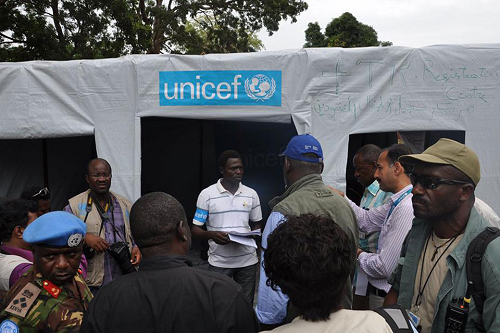South Sudan: Bureaucratic obstacles hindering relief work must stop, says senior UN official
Expressing deep concern over the impact of a series of bureaucratic impediments and access constraints on relief operations, a senior United Nations humanitarian official in South Sudan has called on all parties to allow free, safe and unhindered humanitarian access to the people in need.

Humanitarian partners have responded rapidly and are working around the clock to assist people in Wau, South Sudan.
“Humanitarian organizations in South Sudan are striving every day to save lives and alleviate suffering across this country,” said Eugene Owusu, Humanitarian Coordinator for South Sudan in a news release issued by the UN Office for the Coordination of Humanitarian Affairs (OCHA).
“Yet, they continue to face obstacles and challenges which hamper their efforts. This must stop.”
According to OCHA, some 91 humanitarian access incidents were recorded from 1 to 28 November. Of these, 64 incidents (little more than 70 per cent) involved violence against humanitarian personnel or assets. Another 18 incidents (about 20 per cent) involved interference in humanitarian action, including interference in administrative matters, illegal or arbitrary taxation, and expulsion of staff.
Also in November, relief workers were denied access to areas outside of Yei in Central Equatoria and Wau in Western Bahr El Ghazal, where tens of thousands of people are in need of assistance and protection.
The UN humanitarian arm further reported that needs in the country continue to rise due to the conflict and economic decline. It is estimated that about three million people have been displaced, of which more than 1.1 million people have fled to neighbouring countries as refugees, since fighting first broke out in December 2013.
Further in the release, Mr. Owusu also noted steps taken by the Government to address the access challenges, including the establishment of a high-level humanitarian oversight committee.
He, however, added that the recent incidents were a “major challenge” and that the commitments needed to be translated into “real, tangible and immediate improvements in the operating environment for aid workers on the front-lines of humanitarian action.”
Source: United Nations
- 338 reads
Human Rights
Fostering a More Humane World: The 28th Eurasian Economic Summi

Conscience, Hope, and Action: Keys to Global Peace and Sustainability

Ringing FOWPAL’s Peace Bell for the World:Nobel Peace Prize Laureates’ Visions and Actions

Protecting the World’s Cultural Diversity for a Sustainable Future

Puppet Show I International Friendship Day 2020

